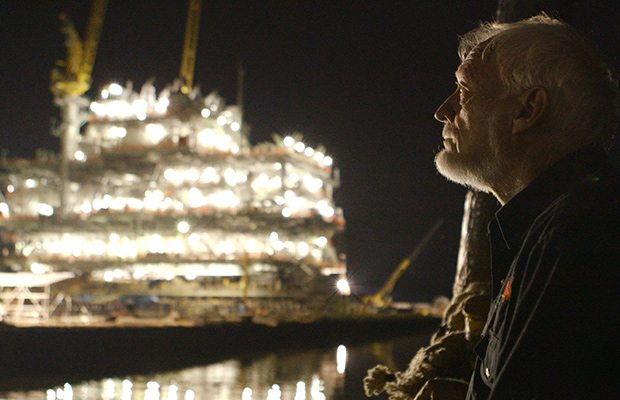
 It all comes down to one image: a map of the Gulf of Mexico. The enormity of the sea is evidenced by tiny red dots showing areas of deep water drilling scattered all along the coast and outward, like little sprinkles spilling onto the floor of an ice cream parlor. At the center of this, is the Deep Water Horizon rig, which is the focal point of Margaret Brown's stunning The Great Invisible. The fact that there still has not been a conclusive explanation as to what caused the explosion back in April of 2010 is what makes this map so startling.
It all comes down to one image: a map of the Gulf of Mexico. The enormity of the sea is evidenced by tiny red dots showing areas of deep water drilling scattered all along the coast and outward, like little sprinkles spilling onto the floor of an ice cream parlor. At the center of this, is the Deep Water Horizon rig, which is the focal point of Margaret Brown's stunning The Great Invisible. The fact that there still has not been a conclusive explanation as to what caused the explosion back in April of 2010 is what makes this map so startling.
The documentary touches on a number of important chain reactions caused by the explosion of the oil rig, including the environmental impact, the Congressional reaction (or lack thereof), as well as the tragic loss of ten lives. As poorly handled as the situation was (and remains) on corporate America's part, Brown's documentary tends to favor depicting the human consequences of the tragedy. The film checks in with family members of the rig employees and several cities bordering the Gulf, showing just how far-reaching the devastation is. Towns that previously thrived on fishing the waters are now facing crushing poverty as a direct consequence of the spill. It's truly haunting to see how these once thriving fishing communities are now quiet, desolate, and impoverished.
The skill of the director's hand is how she maintains objectivity throughout. You never feel like an agenda is being forced onto you, and Brown makes sure to cover how BP did make attempts, albeit limply, to compensate those affected by the tragedy. Although, it is made clear that this money hasn't reached many of those who need it. "The Great Invisible" ultimately raises many important questions about deep water drilling rather than proposes any one solution. The arguments for/against oil drilling are somewhat irrelevant here, because a more pressing question Brown leverages is: "Why has greed precluded safety?" In a Congressional hearing following the explosion, the major oil company CEO's–to their chagrin–are outed as being totally unprepared in the event that a similar explosive event should cause an oil leak. This is where the bulk of Brown's film spends its time, wrestling with the innate capacity of corporate America for greed and an overall lack of humanity. The father of a Deep Water employee who died in the explosion summed up the film's emotional ammunition rather succinctly, with "Somebody ought to feel something."
Luckily, Brown's film does make you feel something. Even in hardship, the human ability to organize and strengthen remains. The charitable work of a church volunteer in Alabama is upbeat and hopeful, as he delivers food to poverty-stricken homes in the bayou. Ultimately, Brown has crafted an incredibly important film that shines a light on the contrasting corporate greed that faces our capitalist, consumerist world. She has succeeded in the sense that what may or may not have been "invisible," is now being brought into focus, and hopefully, will be on people's minds for years to come.